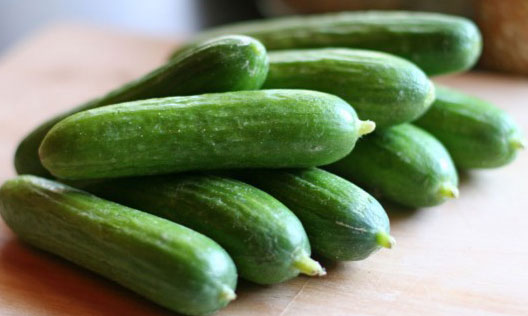Cucumbers are scientifically known as Cucumis sativus and belong to the same botanical family as melons (including watermelon and cantaloupe) and squashes (including summer squash, winter squash, zucchini and pumpkin). Commercial production of cucumbers is usually divided into two types. “Slicing cucumbers” are produced for fresh consumption. “Pickling cucumbers” are produced for eventual processing into pickles. Cucumber is easy to grow. Different varieties, varying in size, shape, and color, are cultivated all around the world. In general, the fruit features dark green skin, crispy moisture rich flesh, and small edible seeds concentrated at its center.Slicing cucumbers are usually larger and have thicker skins, while pickling cucumbers are usually smaller and have thinner skins.Because of its high water content many health benefits of cucumber are physical, such as clear skin, reduction in under eye swelling and sunburn relief. But the water content in cucumbers is also responsible for helping rid your body of toxins that can make you sick.Cucumbers have mild diuretic property probably due to their high water and potassium content, which helps in checking weight gain and high blood pressure. When combined with a well-balanced diet, cucumbers can help you regulate blood pressure.
to the same botanical family as melons (including watermelon and cantaloupe) and squashes (including summer squash, winter squash, zucchini and pumpkin). Commercial production of cucumbers is usually divided into two types. “Slicing cucumbers” are produced for fresh consumption. “Pickling cucumbers” are produced for eventual processing into pickles. Cucumber is easy to grow. Different varieties, varying in size, shape, and color, are cultivated all around the world. In general, the fruit features dark green skin, crispy moisture rich flesh, and small edible seeds concentrated at its center.Slicing cucumbers are usually larger and have thicker skins, while pickling cucumbers are usually smaller and have thinner skins.Because of its high water content many health benefits of cucumber are physical, such as clear skin, reduction in under eye swelling and sunburn relief. But the water content in cucumbers is also responsible for helping rid your body of toxins that can make you sick.Cucumbers have mild diuretic property probably due to their high water and potassium content, which helps in checking weight gain and high blood pressure. When combined with a well-balanced diet, cucumbers can help you regulate blood pressure.
 Although not a fat burning superstar on its own, adding cucumber to a salad can help boost your daily fiber intake for increased fat burning for weight loss. And thanks to the water content, you’ll get the fluid you need to help process fiber. The peel of the cucumber is an excellent source of dietary fiber than can relieve constipation and protect against some types of colon cancer.
Although not a fat burning superstar on its own, adding cucumber to a salad can help boost your daily fiber intake for increased fat burning for weight loss. And thanks to the water content, you’ll get the fluid you need to help process fiber. The peel of the cucumber is an excellent source of dietary fiber than can relieve constipation and protect against some types of colon cancer.
t is a very good source of potassium, an important intracellular electrolyte. Potassium is a heart friendly electrolyte; helps reduce blood pressure and heart rates by countering effects of sodium.

